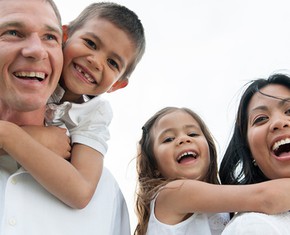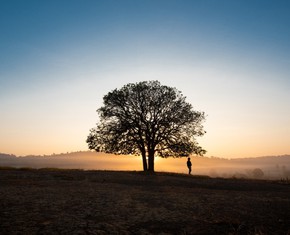The views expressed in our content reflect individual perspectives and do not represent the authoritative views of the Baha'i Faith.
For as long as I can remember my mom—an outspoken and reflective social worker—has worked in a school setting.
She’s worked with kids of all ages: kindergarteners brand new to school, middle schoolers in the crucial age of finding their voices, and high school-aged youth who often discover new heights of independence. Though the ages of her students have varied, she’s almost exclusively worked with young people who have been diagnosed with emotional and behavioral disorders.
An exponential number of factors impact this line of work. A person’s emotional and behavioral well-being can be dampened by family stress, negative societal expectations, genetic predispositions, stress related to community violence, attachment style disruptions, negative peer influences, etc. This list goes on and on.
One thing she has observed over the years: the role diet and food play in shaping the lives of her students. How can anyone really expect young people who had chips and sugary high-fructose based drinks for breakfast come to school, sit calmly at a desk, and focus on new academic material? Is it really surprising that these young people struggle behaviorally? How could diet be shifted to help more young people flourish at school? Diet is widely understated in the mainstream solutions for emotional and behavioral disturbances in young people.
While many indigenous cultures across the globe have been well-aware and are much more practiced in the use of food as medicine, the colonizing Western world seems to still be in the early stages of adapting these methods. One of the central figures of the of the Baha’i Faith, Abdu’l-Baha, said that humanity will learn much more about how to effectively use food to heal:
… it is possible to cure illnesses by means of fruits and other foods. But as the science of medicine has not yet been perfected, this fact has not been fully understood. When this science reaches perfection, treatments will be administered with fragrant fruits and plants as well as with other foods … – Abdu’l-Baha, Some Answered Questions, newly revised edition, p. 299.
Of course, the ability to use food effectively to promote both physical and mental health is dependent on addressing the presence of food deserts—the highly racialized lack of local access to fresh produce—as well as blind spots in nutritional education, and issues related to cleaning up the way we produce what we eat. It seems numerous modes could further move humanity towards actualizing the future reality Abdu’l-Baha describes.
On the other hand, we have excelled at advancing more complex forms of “modern” medicine. The fruits of science are miraculous, and of course entirely crucial considering that many traverse lives with vicious diseases and disorders. However, in some arenas of medicine, are we becoming dependent? Are we struggling to keep our scientific aspirations focused on balanced and natural well-being?
The Baha’i teachings suggest:
Do not neglect medical treatment when it is necessary, but leave it off when health has been restored. Treat disease through diet, by preference, refraining from the use of drugs; and if you find what is required in a single herb, do not resort to a compound medicament … Abstain from drugs when the health is good, but administer them when necessary. – Baha’u’llah, quoted by J.E. Esselmont in Baha’u’llah and the New Era, p. 106.
Beyond relying on drugs, we can leverage the power of visualization, prayer, and hope as a way to increase healing. For some, there seems to be a contradiction between relying on spiritual forces to heal or trusting God’s will, and taking advantage of scientific developments in medicine—but Baha’is believe that the two can coexist:
There are two ways of healing sickness, material means and spiritual means. The first is by the treatment of physicians; the second consisteth in prayers offered by the spiritual ones to God and in turning to Him. Both means should be used and practised. – Abdu’l-Baha, Selections from the Writings of Abdu’l-Baha, p. 151.
This aligns with one of the central teachings of the Baha’i Faith: the harmony of science and religion:
If religion were contrary to logical reason then it would cease to be a religion and be merely a tradition. Religion and science are the two wings upon which man’s intelligence can soar into the heights, with which the human soul can progress. It is not possible to fly with one wing alone! Should a man try to fly with the wing of religion alone he would quickly fall into the quagmire of superstition, whilst on the other hand, with the wing of science alone he would also make no progress, but fall into the despairing slough of materialism. – Abdu’l-Baha, Paris Talks, p. 144.
What seems clear is that how we address health is deeply interconnected with other issues surrounding how our society treats the poor, how race impacts what our access to food looks like, and the effect consumerism has on how we utilize medicine and view wellness. Both science and religion together offer useful tools for the progress of this multifaceted endeavor.
















Comments
Sign in or create an account
Continue with Googleor